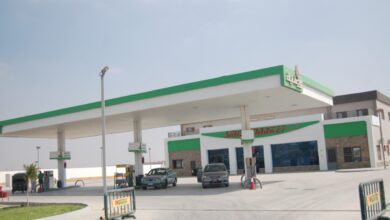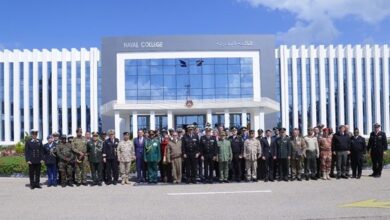At the beginning of the Cairo-Suez desert road stands a building with the look of a military barracks. Moving closer to the building, however, a plaque reads, “The Arab Organization for Industrialization” with the Quranic verse, “You shall prepare for them all the power you can muster” inscribed above. In the middle of the logo is a drawing of a fighter jet with electric circuits behind it.
On 12 August, President Mohamed Morsy forced Abdel Aziz Seif al-Din, Air Defense commander, into retirement and appointed him as the president of the state-owned the AOI. Seif al-Din succeeded Hamdy Waheeba, a former chief of staff.
The AOI consists of 12 factories with 16,000 workers. Seventy percent of the factories’ products are for civilian use while the remainder is related to the maintenance of aircraft, military vehicles, and the manufacture of their engines and spare parts.
While the AOI primarily caters to civilian needs and does not fall under the direct authority of the Armed Forces, it is one of the four main pillars of the military economy which experts say constitutes 11 percent of the overall economy of Egypt.
Established in 1975 to supply the army with training jets, the AOI, like most of the projects and assets of the Armed Forces, is not monitored by the Central Auditing Authority, and its budget is outside the purview of parliamentary scrutiny.
In that respect, the AOI is similar to the Ministry of Military Production and other revenue-generating projects run by the military such as clubs and hotels as well as contracts for operating some civilian public facilities.
The AOI has the word “Arab” in its title because several Gulf countries shared in its establishment. This is the reason why it is not governed by the Labor Law, Law 137/1981, or even its amendment in 2003. The AOI does not pay customs for the imported materials it uses, nor are its revenues taxed.
It has its own bylaws and a supreme committee headed by the president, who is joined by the AOI chief executive, and the members of the board who are the factory heads and legal advisers.
According to official data released by officials in March, the AOI makes an annual net profit that ranges between LE470 million to LE475 million from a yearly total sales volume of LE3.4 billion.
Officials from the AOI say the profits are not pocketed by the state, but are reinvested in the company.
Mahmoud Emara, an expert on political economy, says the lack of transparency regarding the activities of the AOI, its sources of funding, and the use of its profits, raise questions on the underlying health of the company. He says that it is unclear whether it would be competitive with other companies were its privileges to be stripped.
Emara says that for a proper assessment of the AOI's health and performance, additional information is needed. “How much money has been injected into the AOI to enable it to make such profits?” he asks.
Legacy and Activities
Under former President Sadat, Egypt established the AOI to activate the Joint Defense and Economic Cooperation Treaty signed between Arab countries in 1950.
AOI's initial capital, to which Qatar, Saudi Arabia and the UAE contributed, exceeded US$1 billion. The idea behind the AOI was to combine Egyptian military industrial know-how with labor and money in the oil-rich Gulf.
Since its establishment, the AOI has never had a civilian chief executive. Its first chief executive was Ashraf Marwan, the political adviser to Sadat, who came from a military background. Marwan, who appears to have spied for both Israel and Egypt, and whose real allegiances were unclear, died in 2007 in London after “falling,” for unknown reasons, from his balcony.
When Egypt signed a peace treaty with Israel in 1979, amid opposition by some Arab countries, Gulf countries decided to withdraw their capital before the AOI could achieve its mission of becoming the principal weapons manufacturer for several Arab countries.
Nonetheless, when the organization was reestablished as a purely Egyptian venture, it continued to enjoy the privileges which its international origins had brought.
Since the peace treaty included provisions for annual US military aid to Egypt, including arms, fighter jets and spare parts which now total US$1.3 billion, the role of the AOI as the supplier of military products has declined.
Of its factories, two were supposed to expand their production of military equipment after coming under the authority of the newly-established AOI. The first was an aircraft maker established in 1950 which currently only makes training aircraft, the Alpha Gate and Al-Qahira HA-200 models. The other was a factory, established in 1960, which manufactured engines for the HA-200 and the fighter jet Helwan HA-300.
But, two factories that make the biggest profits for the AOI are in the realm of civil industries. The first, near Helwan, is an electronics factory, established in 1979, which makes telephones, TV sets, and satellite receivers under the brand-name Pluto.
The second is Arab-American Vehicles, established in 1977 under a license from American DaimlerChrysler. Major General Hussein Mostafa, the director of the factory, told Al-Masry Al-Youm that his factory makes approximately 17,000 Jeep Cherokee cars every year, largely for the Egyptian military and consumer markets.
The factory is also licensed to make some models of the Korean Kia and French Peugeot.
Stately authority
“Our financial activity is not monitored by the Central Auditing Authority or the People’s Assembly and our revenues are not taxed. The bigger part of our revenue remains to be invested in the AOI and nothing goes to the state,” says Waheeb. “But, I am totally ready to go to the People’s Assembly and answer any questions raised by its members,” Waheeba told Al-Masry Al-Youm in March.
Zeinab Abul Magd, professor of History at Oberlin College in Ohio, who conducted field visits to a number of the AOI’s factories, said the fact that the organization is not subject to scrutiny shrouds it in ambiguity and gives the impression that it is a military institution with a civilian tinge whose chief goal is to provide jobs for retired military personnel.
“Factory heads, most of whom are retired generals, told me that the Armed Forces possesses administrative expertise that should be made use of in several fields, including industry,” adds Abul Magd.
Waheeba, on the other hand, told Al-Masry Al-Youm that of the total number of employees at the AOI, only 200 are former military officers.
According to Waheeba, the top positions are held by former military officers. Out of 12 chairpersons, five are former officers, besides 30 veteran officers who work in senior administrative positions.
He says that three private accounting and auditing offices review the annual production and profits made by the AOI and then issue two reports, one in Arabic and one other in English. The report is submitted to the president for endorsement.
“How much is the AOI’s budget and how are its profits distributed in detail?” wonders Abul Magd. “AOI officials say 15 percent of its revenues are distributed among the employees and the rest caters to salaries, services and the AOI’s investment portfolio. But the entire process remains ambiguous.”
Operational issues
In June 2010, a military tribunal sent the former chairman of the Arab-American Vehicles Company to two years in prison and his wife to a suspended prison sentence of one year. The two were also fined LE2.72 million for taking a bribe equivalent to 2 percent of the Egyptian sales of the German carmaker Mercedes (which has an international partnership with DaimlerChrysler, one of the stockholders in the AOI’s company) in return for facilitating their work in Egypt, in a case known in the media as the “Mercedes Bribe.”
Some of the AOI’s factories have also witnessed worker protests. The first was in August 2011 and the second in February of the next year. In the second sit-in, the AOI fired three of 300 protesting workers, saying they incited their colleagues to assault factory officials.
Since it is not subject to the provisions in the Egyptian Labor Law, the AOI’s workers cannot form trade unions to present their demands like other private sector companies. There is however a judicial committee, composed of representatives from the Ministry of Justice and the State Council, a senior judicial body, which handles conflicts between the workers and AOI officials.
“It is illogical to have an industrial organization that is not monitored or held accountable to professional criteria while it engages in international industry. If it continues like this, then [President Mohamed] Morsy would be acting the same way as former President Hosni Mubarak and his predecessors,” says Emara.




